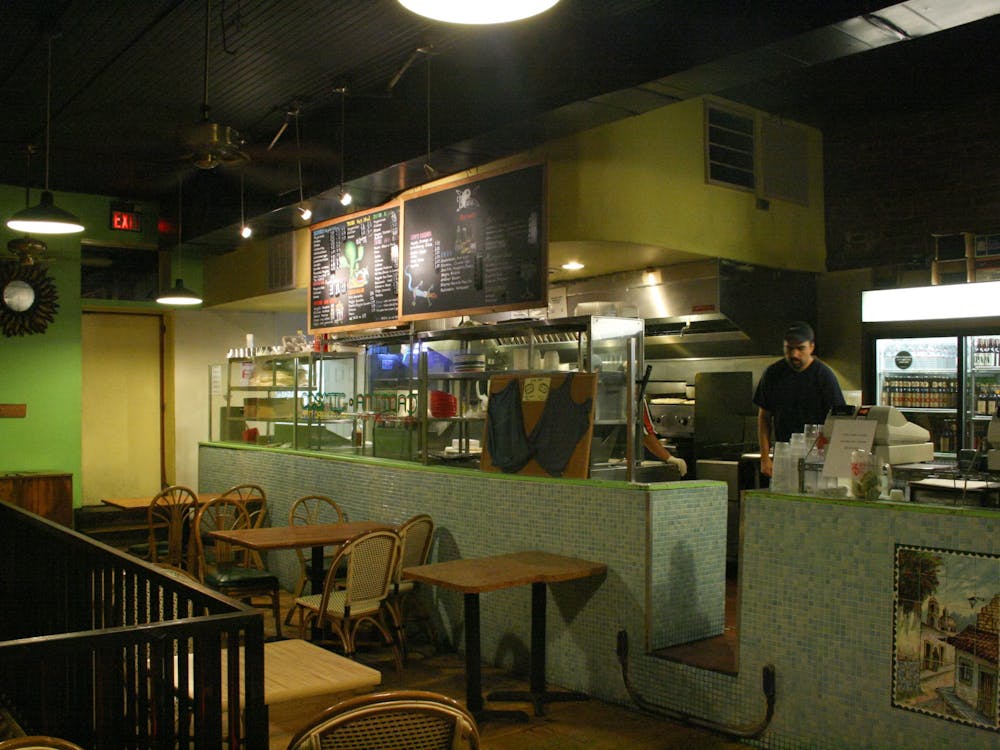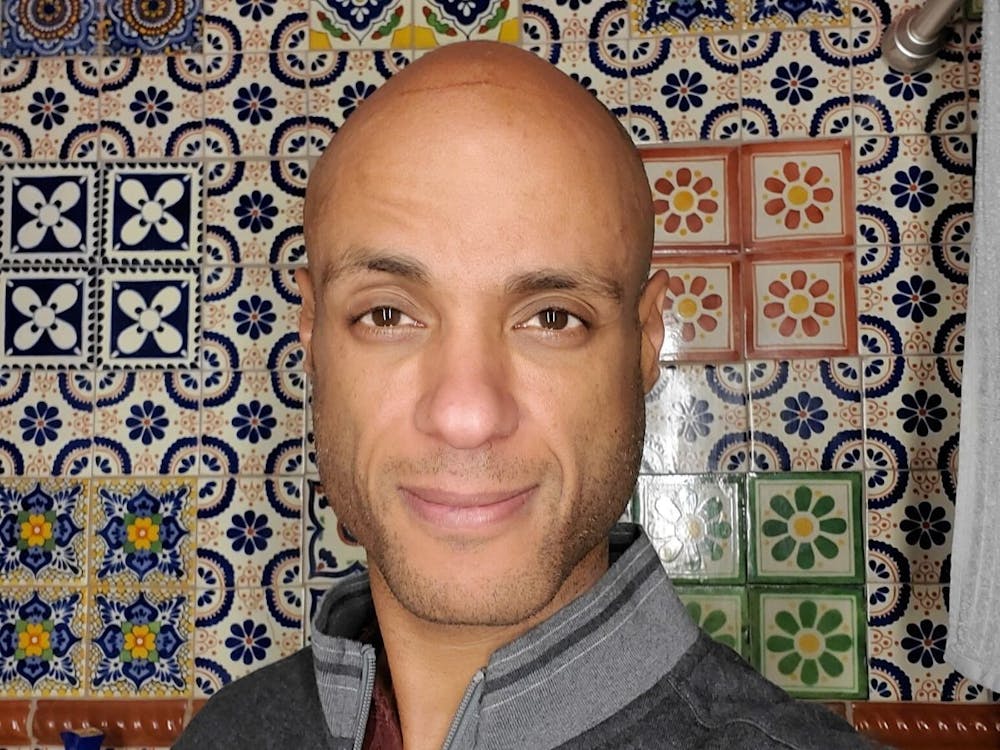As a kid growing up in San Francisco, Cosmos Lyles, Pratt ‘95, loved to frequent the local burrito restaurants. When he eventually moved across the country to enroll at Duke in 1991, the dearth of California burritos in Durham hit him especially hard.
“There was nothing here,” he said. “There wasn’t even Chipotle back then.”
The culinary landscape needed fresh flavors, Lyles decided. Returning to the burrito haven of San Francisco was out of the question. The only alternative? Bringing the burrito—an “autonomous entity,” as he puts it—to Durham.
In the fall of 1995, he and a couple of other friends began selling burritos from a small establishment on Ninth Street called Cosmic Cantina. Since then, Cosmic Cantina has become a staple of the Duke experience. Countless students have tasted the cheap, aluminum-wrapped burritos, often late at night after a party.
As Cosmic Cantina’s influence has expanded, so have Lyles’s ambitions. After founding Cosmic Cantina in Durham, he established another Cosmic Cantina in Manhattan’s East Side, drawing many students from New York University, which eventually closed in 2010 when the lease expired.
In 2010, Lyles also invented EverTune, a guitar bridge designed to maintain the instrument in tune indefinitely. The device has garnered approval from musicians as influential as Joe Satriani, as it was showcased on the Consumer Electronics Show, featured in The New York Times Magazine’s 10th Annual Year in Ideas and awarded an invention prize from Popular Science Magazine.
With hobbies ranging from physics and engineering to burritos and bass guitars, Lyles innovates in his business ventures by integrating his disparate interests. EverTune combines his long-standing appreciation for guitar music with his grasp of mechanical physics: the device incorporates spring technology to keep guitars in tune.
Lyles has also introduced EverTune technology to the furniture business, chopping wood from his 6-acre property and equipping it with EverTune springs to create foldable beds.
He’s “always innovating,” said Brad Lionheart, a technology entrepreneur and friend of Lyles who first met him at the Cantina’s Manhattan location. “That’s just his nature.”
Cosmic Cantina, a ‘funky, homegrown flavor’

At first glance, Durham’s Cosmic Cantina appears unassuming. It’s housed on the second floor of a white brick building, nestled between the Ninth Street Dance Studio and Pincho Loco Ice Cream. A passerby might easily breeze past the narrow, arched entrance, adorned on either side by electrical boxes and power lines. Inside the doorway, fluorescent bulbs illuminate the layers of graffiti accumulating on the walls of a staircase leading to the Cantina.
The restaurant itself contains a blue-tiled counter at which tonight’s customers—a woman with a Grub Hub box, two girls laughing together—can order and watch their food being prepared. A bearded man wearing a Nike hat ladles cheese and rice on to two overlapping tortillas. Behind him, another worker flips hunks of sizzling meat. Latino music bumps in the background. It’s a “funky, homegrown flavor,” as Lyles put it.
Bald with a sharp jawline and a scintillating smile, Lyles is seated at a wooden table close to the entrance, with three red wicker chairs. He speaks in a casual, almost languid, tone, gazing into the distance as he recollects past experiences.
“[This restaurant’s] been around for more of my life than it hasn’t,” he said.
The restaurant first opened more than 24 years ago, on Sept. 1, 1995, but he still feels a “personal connection” to the Cantina.
Before coming to Duke, Lyles attended a college prep school in San Francisco, and he embraced music early on, especially piano. When picking universities to attend, he contemplated enrolling at Stanford University, but he decided he wanted to attend school further from home.
Duke’s flexible curriculum offered Lyles the opportunity to explore a wide array of interests. He expanded his passion for music by regularly strumming his guitar in his dorm room, and he also triple majored in electrical engineering, physics, and literature, relishing the intense academics.
“I could have easily been an academic my whole life,” he said.
Besides intellectual pursuits, he indulged in a number of escapades. Back in the 1990s, he recalled, there used to be “big, open kegs” on East Campus.
“It was quite the draw,” he said, chuckling.
He also grinned as he recounted the times he snuck in at halftime instead of tenting for Duke basketball games or the intoxicated moment at Myrtle Beach when he resolved to become vegetarian. He’s stuck to it.
Lyles established the Cantina in Fall 1995, which was his last semester at Duke because he took an extra semester to finish his three majors. Initially, both the employees and customers derived entirely from the student body, with most of the regulars being personal friends from Duke. He had walked on the football team in his last year, so football and lacrosse players would often come to eat.
The challenge of academics at Duke paled in comparison to the hurdle of starting a restaurant business, Lyles said.
“You got a million fires to put out,” he explained. “At least at Duke it’s codified, and there’s no unknowns. With restaurants everything is unknown, and sometimes you feel like you have to do the impossible.”
During its first two years, the Cantina was a business failure. It opened irregularly, often three times a week at 10 p.m. Sometimes, the restaurant would draw large groups of 200 people, but the restaurant lacked the manpower to serve so many, often turning away customers empty-handed.
Eventually, Lyles shifted away from hiring students and began employing local Durhamites, a choice that crucially altered the restaurant’s cultural flavor. The Cantina became a gathering spot for a more diverse array of people—late night partiers and hungry students, but also young professionals and other long-time Durham locals.
Since that day, Lyles has maintained much of the original batch of employees. Most of them have worked at Cosmic Cantina for over 20 years.
Lyles gestures at one of the workers behind the counter in the process of blanketing a burrito in aluminum foil.
“The guy doing burritos has been here since maybe [1997],” he said.
He and the employees are family in a way, Lyles said, who is unmarried. Back in the day, the group would often take trips to Wilmington Beach to mark the end of a Duke semester.
Now that Lyles has branched out to new locations and has become involved in his EverTune business, he has largely handed off the responsibility of the Durham Cantina to local employees. The restaurant has taken on a life of its own, he said, his voice taking on the wistful tones of a parent who has sent their child off to college.
Relinquishing everyday oversight of the Cantina has enabled Lyles to explore other pursuits. After all, he said, he originally established the restaurant with the goal of buying time and earning money in order to eventually begin following his true passion.
“My dream was always to be an inventor,” he says.
EverTune: embodying innovation and individuality
Lyles launched EverTune, his all-mechanical bridge system for guitars, in 2011, in partnership with co-inventor Paul Dowd. In a Youtube video produced by the company, Lyles appears in a light yellow polo, framed against a white backdrop. Speaking in a slow, measured tone, he explained the mechanics behind EverTune.
The essence of the device is the “saddle module,” which consists of a series of springs, one for each string. Each spring attaches to a lever, which then pulls on one of the guitar strings. These springs maintain the proper tension so that the guitar remains in tune even when the strings loosen due to temperature changes or everyday strumming from a guitarist.
“Ask any engineer how to flatten a tension curve, which is what EverTune does,” he told The New York Times Magazine, “and 9 out of 10 of them will say you should use a spring-and-lever system like the one I designed.”
Synthesizing Lyles’s interests in music and engineering, EverTune embodies his eclectic interests. But his work with EverTune also reveals the innovative and individualistic personality of a man who frequently wears different colored shoes and who has taught himself how to play Beethoven Sonatas.
“He’s an individualist,” said Marshall Stroscio, a Durham native who worked on social media marketing for EverTune. “He’s such an original thinker. He always figures out his own way of doing things.”
In a similar vein, Lyles does not foresee himself starting a family. “I’m not really the kind of guy that needs to slow down to teach somebody else how to be a human,” he says.
Stroscio first met Lyles in 2002 at a restaurant in Durham called Another Thyme. Although the two are now close friends, Stroscio remembered Lyles being somewhat aloof during their first interactions.
“He’s not somebody who goes out of his way to be sociable or follow conventional rules for meeting people,” Stroscio said.
Eventually, Stroscio began playing guitar at the first floor underneath Cosmic Cantina, which Lyles had outfitted as a bar with a live music venue. Lyles himself would sometimes join in, incorporating unconventional time signatures into the melody, Stroscio recalled.
Lyles almost always requested that musicians improvise when at his venue, Stroscio said. Everything would happen from the ground up, in the moment, with the musicians bouncing melodies off each other. It was messy business with constant opportunity for mistakes. But, done right, it dazzled.
His ‘stamp of idiosyncrasy’
Toward the end of our conversation at Cosmic Cantina, Lyles points up at the Cosmic Cantina logo, fixed near the top of a blackboard containing the drinks menu. The logo consists of the black and white yin and yang symbol surrounded by two circular lines resembling the rings of Saturn, or the path of electron orbits around an atom.
As Lyles explains, the yin and yang image—the complementary union of disparate ideas—symbolizes a philosophy that he has readily embraced. He is conscious of how divergent some of his interests are, from physics and engineering to tortillas and guitar tuning.
But, ultimately, it’s his own “stamp of idiosyncrasy,” the quirkiness and ingenuity he brings to each pursuit, that unites this motley of interests, he said.
This explains why he steadfastly resists turning the Cantina into a corporate chain, and why he admits he could never see himself working for a large engineering firm. To do so would nullify the driving force behind each of these ventures, that element that wraps all the rest together, or, as he puts it, imparts each one with “flavor.”
“There’s always a Cosmos,” he said.
Get The Chronicle straight to your inbox
Signup for our weekly newsletter. Cancel at any time.

Chris Kuo is a Trinity senior and a staff reporter for The Chronicle's 118th volume. He was previously enterprise editor for Volume 117.

